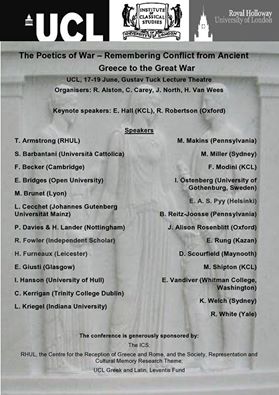by Emma Bridges
Last week I attended an international conference entitled ‘The Poetics of War’ at University College London. For researchers like me, whose work focuses on cultural responses to armed conflict in the ancient world, reflections on the centenary of the First World War provide the opportunity for drawing comparisons between the memorialisation of wars in more recent history and those of the classical past. This conference brought together classical scholars as well as those working in other fields, and our shared interests in the ways in which war is remembered from a range of different perspectives – personal, local, and national – and via different written and artistic media made for some thought-provoking discussions.
Topics covered ranged from ancient Greek and Roman literary, monumental and artistic commemorations of war to the ways in which more recent conflicts – the Crimean War as well as World War I – have been memorialised. We thought too about the overlap between these periods, and in particular about many of the ways in which the classical tradition has influenced more recent responses to war. Particular highlights for me included Edith Hall’s keynote lecture on David Jones’ modernist war poem In Parenthesis, and a talk by Elizabeth Vandiver, whose important work on classical influences on the poetry of the First World War is an outstanding example of recent work in classical reception studies.
In my own paper I sought to bring something of my own research into female perspectives on war to the conference. I focused on a twentieth century historical novel by Naomi Mitchison, Cloud Cuckoo Land (1925) which, although set in the closing years of the Peloponnesian War in the fifth century BC, also reflects some of the wartime experiences of the generation of women who had lived through World War I. Although 1920s literature is something of a departure for me in relation to previous research I’ve undertaken, the opportunity to think about how some of the themes of my work might resurface in this historical period was a valuable one. In particular it led to interesting conversations about gender roles in wartime and the extent to which war narratives are often dominated by male voices, as well as women’s engagement with the classical tradition.
As always at such an event it is those exchanges with other scholars working in related fields which offer the opportunity to make fresh connections – both in terms of meeting new people and in thinking about the material on which we are working. If it’s a sign of a successful conference to return home with both a reading list and a contacts list that are longer than they were at the start of the event, this occasion was certainly a fruitful one!
All talks from the conference were recorded and will be available in due course via the YouTube channel of UCL’s Classics department; I’ll post the link here when they are live.